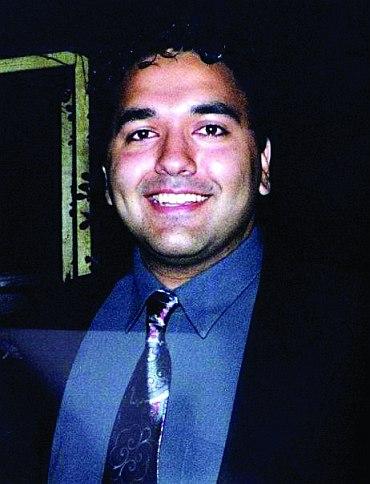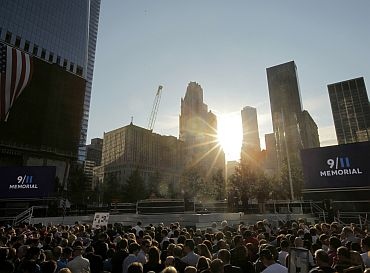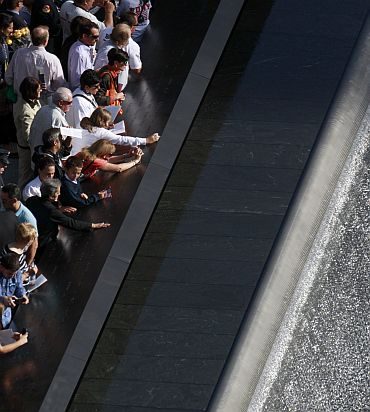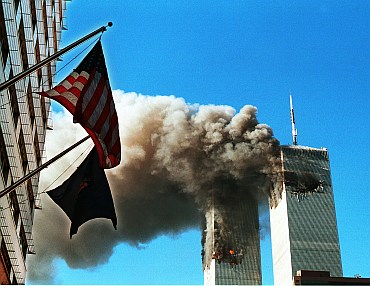Arthur J Pais in New York
Misery and insult have accompanied the family of Salman Hamdani, who died while trying to rescue survivors during the 9/11 strikes. His mother Talat has spent the last 10 years fighting discrimination and misbelieves over 'Islamophobia' in the US. This should not happen anywhere, especially not in my son Salman's America, she tells India Abroad's Arthur J Pais.
 |
Mohammad Salman Hamdani, a New York City police cadet, died on September 11, 2001 after he raced to the twin towers of the World Trade Centre to help the survivors.
But for several weeks, in many publications in America, he was suspected to be a terrorist.
When his DNA was verified weeks later, the truth finally emerged. He would soon earn a mention in the Patriot Act for his bravery.
"Everyone who was familiar to him knew that he would have immediately wanted to help others in times of crisis," said Joseph Nekola, a senior director at Rockefeller University, where Salman worked.
Please ...
'Islamophobia, particularly in US, disturbs me immensely'
Image: The sun rises during ceremonies marking the 10th anniversary of the 9/11 attacks on the World Trade Center, in New YorkPhotographs: Brian Snyder/Reuters
His life was captured in an 11-minute film Mira Nair made for the omnibus -- 11'09''01-September 11.
In Toronto, where the film was screened, Nair spoke about the short life of Salman Hamdani, who was only 23 when he died. And about the all-American upbringing of the boy who became an object of suspicion in the eyes of his neighbours and many friends.
Nair had said, "I wanted to make a film about the reality of life for South Asians in New York City after September 11, 2001. Life has changed irrevocably, and I think forever. From New York to Gujarat, the Islamophobia that has taken over the world disturbs me immensely. The Islamophobia in particular in America concerns me immensely. As a filmmaker, I thought it was about time we spoke up."
Shortly before 9/11 Hamdani had begun working as a research technician at the Howard Hughes Medical Institute at Rockefeller University. He drove an ambulance part-time apart from being a certified emergency medical technician and a police cadet.
The day he died, Salman had left home with a Quran in his backpack. He was looking forward to a date after work in New Jersey with a young woman he had met online.
'Terrorism has no religion'
Image: Talat Hamdani has become one of the most visible anti-war protestors."His kindness was almost legendary. While studying in London during his junior year in college, Salman saw a homeless woman with blood on her face. He spoke with her, tended to her bloody nose and gave her some money," his mother Talat Hamdani said.
His mother has become one of the most visible anti-war protestors. She works with many civil rights organisations including South Asian Americans Leading Together. She was in the news a few months ago when House Homeland Security Committee chairman, United States Congressman from New York, Peter King held a hearing on extremism among Muslims in America. She has become a prominent Muslim spokesperson for tolerance and fairness towards Muslims in America. By extension, she says, her fight is for all immigrants.
Talat Hamdani says, "When Salman was about 13 or 14, he decided to become a vegetarian. He never told me why. And I don't think I asked him why.
"When he was about 12 he rescued sick pigeons from New York's streets and nursed them back to health.
He was always compassionate. I was eating chicken one day. And he looked at me and said, 'Mom, you know what you are eating was alive?' I have almost become a vegetarian. I find it difficult to cook meat Salman's thoughts flood my mind, and I think of his kindness, she continues.
"But then I wonder why there isn't enough kindness around?
The other day, soon after Osama bin Laden was killed, a few students at the school near New York where I teach came to me and said things like: 'Why don't you go back to Pakistan? Some said: 'Why don't you go to bin Laden?'"
"Now, people at the school know about my son and my loss, yet they were reacting like this. I thought to myself: They were kids when 9/11 happened. So where do they get this hatred and misunderstanding about Muslims? Surely, it is from parents or family and the media," she feels.
"As a Muslim-American woman, I find this horrific. I am realising more and more how Islam and terrorism have become synonymous. I hear people say: All Muslims are not terrorists, but all terrorists are Muslims. They ignore the fact that many terrorist activities in America are by people who belong to other faiths. Or may have no religion," she adds.
'9/11 took two lives in our family'
Image: Family members look over one of the Twin Memorial pools at Ground Zero in New YorkPhotographs: Jessica Rinaldi/Reuters
"When I was teaching in the elementary school, I had brainstormed about 9/11 with the students about eight years ago. When they asked about bin Laden I talked about how he was a creation of American foreign policy, how America had supported him and people liked him to fight the Russians in Afghanistan, and how he turned against the Americans.
I have said openly, after the (killing) of Osama bin Laden that his death should help America come together. I feel that justice has been done finally to all those people that died on 9/11. And I pray that that we will move forward as a united country, and fight for peace and justice. That's why what the teenagers at school told me worries me because they are reflecting the feelings of many people, who are not prepared for this closure," she adds.
"I am known for my work with September 11 Families for Peaceful Tomorrows. I have served on its executive committee. I believe in the quote by Martin Luther King Jr that the organisation has adopted: Wars are poor chisels for carving out peaceful tomorrows. I know Martin Luther King was inspired by Mahatma Gandhi. My son was aware not only of his heritage but also about how many Muslims who migrated to Pakistan had lived and worked in India for many years.
"I was teaching English at a middle school in Queens at the time of my son's death. His father (Saleem) owned a convenience store in Brooklyn. When he was a teenager, my son ran the shop on many evenings and on the weekends.
I was at school when my husband called to give me the news about the Twin Towers. We talked about Salman. I said he would not be there. But then he did not show up for work. I realized he must have gone into the towers because he was a trained EMT. It was just like him to go in and help people.
I am a substitute teacher now, as I have had several accidents including a head-on collision (car accident). I have two other sons (Zeshan and Adnaan), but how I wish Salman was here to help me. My husband died a few years ago. He had heart disease. He had cancer. But I say grief killed him. You know how it is in our part of the world, how fathers are very close to their eldest son. My younger son says that 9/11 took two lives in our family," she says.
'My son did not die for nothing'
Image: The 9/11 attacks that changed the global realityPhotographs: Getty Images
"Many months after 9/11, an unidentified body, along with Salman's medical bag and identification, was found at Ground Zero, the site of the destroyed World Trade Center. His body had not yet been positively identified by DNA profiling so we were told only in March (the following year) about this discovery.
We attended a memorial service in his honour in April at the Islamic Cultural Center in New York. 'Most people would have gone in the other direction' during the aftermath of the attacks, Mayor Michael Bloomberg said, 'He went in to help people.'
(Talat had told journalists then: 'Salman went down in US history The nation honoured him. My son did not die for nothing.')
She remembers Police Commissioner Raymond Kelley saying at the memorial: 'We don't know how many people he helped, how many lives he saved. But if you look at his life, you know he was determined to make a difference, and he did. He was indeed a hero.'
"We had spent many months looking for his remains, but had not made any progress. We visited hospitals, checked the morgue, and posted "missing" fliers. We went to Mecca to pray for his return," she says.
"When I got a call from September 11 Families for Peaceful Tomorrows, I knew I would be doing the right thing by joining the organisation. I went to the meetings with my husband. It was not an easy thing to do. There were a few people there who did not understand that many Muslims were also innocent victims of terrorism. I had a lot of explaining to do," she added.
"I believe that the true martyrs of 9/11 were not the men who piloted planes into buildings, but people like Salman. They gave their lives doing what they believed in.
Many of these martyrs were born in faraway places. People like Salman died for one reason and it was not because they were Muslims or immigrants. They died because they were Americans," she adds.
'My activism has reinforced my faith'
Image: US President Barack Obama with Talat Hamdani"I have said often that my son did not stop to think about the religion or nationality of the people he was trying to rescue. Instead, like scores of other first responders, he acted to save them. It was devastating for us to hear, week after week, of suggestions that because of his heritage he was involved with the attacks," she adds.
"My grief was made worse by the suspicions that clouded Salman's name and the suggestion that his faith -- my faith -- not the acts of 19 murderers, was somehow responsible. And that grief still continues to worry me 10 years later.
"I have said often in the last few years that history teaches that extremism is not a feature of any one ideology, and certainly should not be used to single out and discriminate against an entire community. This should not happen anywhere, especially not in my son Salman's America," she says.
"He was a baby when we migrated to America (from Pakistan) and in no time he became an American boy, fond of comics and Star Wars movies. When I said I had not seen those movies, he said with a smile, 'Mom, you are not an American, then," she remembers.
"My activism has reinforced my faith. It has given me more confidence and certain kind of solace. I am surprised at times that I find myself standing up for a faith as I never had before. It has made me more courageous and helped me to understand the pain of other families who are bereaved," she adds.







article